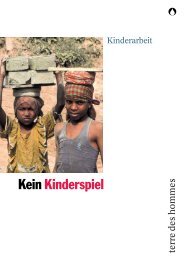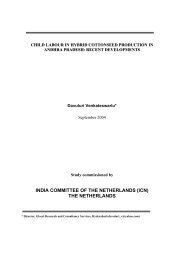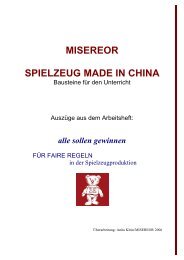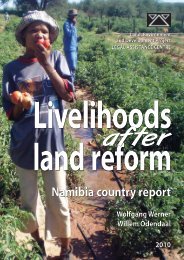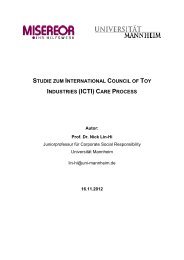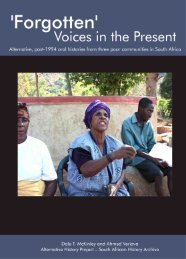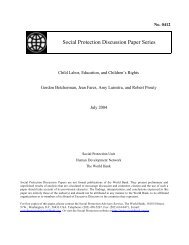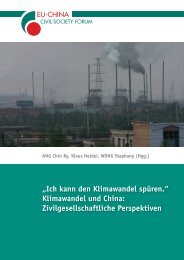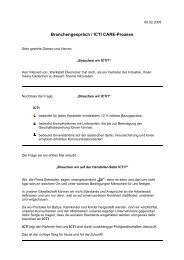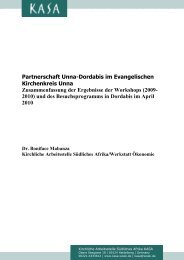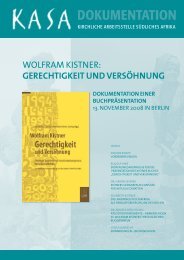“You'll Be Fired if You Refuse†- Human Rights Watch
“You'll Be Fired if You Refuse†- Human Rights Watch
“You'll Be Fired if You Refuse†- Human Rights Watch
You also want an ePaper? Increase the reach of your titles
YUMPU automatically turns print PDFs into web optimized ePapers that Google loves.
problems. In some areas, they should improve the ventilation before we start work, but they<br />
don’t.” 102 In a 2008 article in the International Journal of Environmental Research and Public<br />
Health, researchers took dust samples from Mopani’s two underground mines and found that<br />
“59% and 26% of Mufulira and Nkana Mine samples, respectively, were above the calculated<br />
U.S. Occupational Safety and Health Administration permissible exposure limit.” They<br />
concluded that “weak dust monitoring at these mines … may increase the risk of<br />
nonmalignant disease in many miners” and recommended that “Zambian mining houses and<br />
the government establish crystalline silica analysis laboratory capacity and adopt dust mass<br />
concentration occupational exposure limits for more protective dust monitoring of<br />
workers.” 103 In response to a letter from <strong>Human</strong> <strong>Rights</strong> <strong>Watch</strong> outlining concerns, Mopani’s<br />
Chief Executive Officer David Callow said that the company takes the issue of silicosis “very<br />
seriously and is focused on reducing incidence” through measures including “improved<br />
localized dust management in work places”; programs raising employees’ awareness on<br />
“dust control and personal protective equipment usage”; implementing “personalized dust<br />
monitoring techniques” for Mopani employees working in high-exposure areas; and more<br />
frequent medical checkups. Mopani’s response continued:<br />
Silicosis generally has a long latent period to man<strong>if</strong>est, which can be 20 years<br />
or more, so some of the benefits of [the company’s] focus since privatisation<br />
may not yet be apparent. Even still, incidence has been almost halved since<br />
privatisation. Progress in this area is monitored closely by Mopani’s board. 104<br />
At the processing and smelting operations, miners work with acids and other noxious<br />
chemicals to separate the copper from the rock. Sulfuric acid is one of the most commonly<br />
used substances. As with underground miners, workers are also routinely exposed to dust,<br />
fumes, and other hazardous substances. In certain departments, often referred to as “hot<br />
metal” departments, miners work in environments of extreme heat. Fatal accidents are far<br />
less common in processing than in underground mining, but acid burns and lung disease,<br />
for example, can be common when companies do not comply with safety regulations. 105<br />
102 <strong>Human</strong> <strong>Rights</strong> <strong>Watch</strong> interview with underground drill operator at Mopani, Mufulira, November 15, 2010. A previous report on<br />
Mopani cited an interview in which the miner similarly complained about poor ventilation and also related that the company would<br />
purposefully show other parts of the operations when inspectors came. Les Amis de la Terre and Counter Balance, The Mopani<br />
Copper Mine, Zambia: How European development money has fed a mining scandal, December 2010, p. 17.<br />
103 Patrick Hayumbu, Thomas G. Robins and Rosa Key-Schwartz, “Cross-Sectional Silica Exposure Measurements at Two Zambian<br />
Copper Mines of Nkana and Mufulira,” International Journal of Environmental Research and Public Health, Vol.5, 2008, p. 86.<br />
104 Letter from Danny Callow, chief executive officer of Mopani Copper Mines Plc, to <strong>Human</strong> <strong>Rights</strong> <strong>Watch</strong>, October 12, 2011.<br />
105 <strong>Human</strong> <strong>Rights</strong> <strong>Watch</strong> interviews with miners at the Chinese-run smelting and processing plants, Chambishi and Kitwe,<br />
November 2010 and July 2010; with miners at the Konkola Copper Mines-run smelter, Chingola, November 2010; with mine<br />
union officials, Kitwe, November 2010 and July 2011.<br />
35 HUMAN RIGHTS WATCH | NOVEMBER 2011




